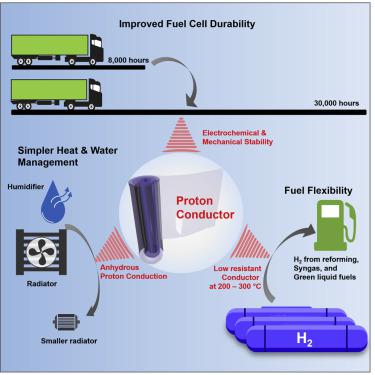Joule ( IF 38.6 ) Pub Date : 2021-06-17 , DOI: 10.1016/j.joule.2021.05.016 Craig S. Gittleman , Hongfei Jia , Emory S. De Castro , Calum R.I. Chisholm , Yu Seung Kim

|
Fuel cells utilize the chemical energy of liquid or gaseous fuels to generate electricity. As fuel cells extend their territory to include heavy-duty vehicles, new demands for proton conductors, a critical component of fuel cells, have emerged. A near-term need is ensuring the chemical and mechanical stability of proton exchange membranes to enable long lifetime vehicles. In the mid-term, achieving stable conductivity of proton conductors under hot (>100°C) and dynamic fuel cell operating conditions is desirable. In the long term, targeting high thermal stability and tolerance to water enables the utilization of high energy density liquid fuels that will increase pay-load space for heavy-duty vehicles. This article presents our perspective on these near-, mid-, and long-term targets for proton conductors of heavy-duty fuel cells.
中文翻译:

用于重型车辆燃料电池的质子导体
燃料电池利用液体或气体燃料的化学能来发电。随着燃料电池的领域扩展到包括重型车辆,对质子导体(燃料电池的重要组成部分)的新需求已经出现。近期需要确保质子交换膜的化学和机械稳定性,以实现长寿命车辆。在中期,希望在热(> 100°C)和动态燃料电池运行条件下实现质子导体的稳定电导率。从长远来看,以高热稳定性和对水的耐受性为目标,可以利用高能量密度的液体燃料,从而增加重型车辆的有效载荷空间。本文介绍了我们对重型燃料电池质子导体的这些近期、中期和长期目标的看法。











































 京公网安备 11010802027423号
京公网安备 11010802027423号